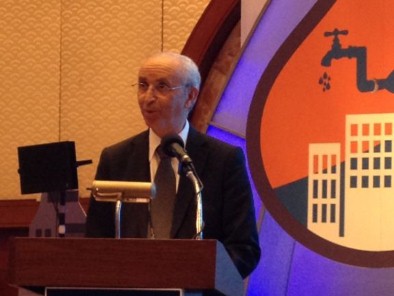With the theme "Securing Water for All”, the Week (13-15 March) covered crosscutting topics such as climate change, the water-food-energy nexus, and disaster management as well as sub-sector specific discussions, including water supply and sanitation, water resources and environment, and agriculture and irrigation. GWP Technical Committee Chair Dr Mohamed Ait-Kadi gave a keynote speech at the official opening on “Securing Water for All”.
The GWP Technical Committee organised the regional workshop on “Sustainable Urban Water Management” in collaboration with the Asian Development Bank to identify critical issues and explore cooperative strategies in integrated approaches for urban water management in Southeast Asia. Organised in the context of the Asia Water Week, it was hosted by the Asian Development Bank in ADB Headquarters in Manila, Philippines. Download agenda.
The main objective of the workshop was to argue for a fundamental change in the way water sector professionals design and manage urban water systems. This paradigm shift should be based on understanding urban water within the wider catchment using IWRM principles that facilitate the equitable allocation of water resources among municipalities, industry, agriculture, energy production, and ecosystem services.
The main principles of integrated urban water management (IUWM), presented at the workshop, are the following:
- Consider the entire water cycle as one system: water sources within a catchment area, water supply, wastewater, storm water
- Provide water fit for purposes: matching water of a certain quality to its intended use
- Maximize the benefits from waste water: recycling and reuse of resources is fostered by more decentralized clustered systems
Professor Kalanithy Vairavamoorthy stated that there are two major uncertainties in terms of a town’s WDS: (i) future water consumption patterns, and (ii) the spatial growth of the town. Thus, water demand in the area, will vary depending on variations in population growth, socio-economic conditions, and physical water losses. It is crucial to take these future variations into consideration together with the extent of the spatial expansion of the town due to unplanned growth. A town may grow in localised areas, however, the extent of the expansion over time is uncertain. Professor Vairavamoorthy summarized his key note presentation by stating that “there is a need to change our thinking about water systems - we need to think of water machines that offer opportunities from all aspects of water - water of different qualities, energy, and nutrients.”
Ralph Philip from ICLEI and Amina Siddiqui from the Karachi Water Partnership completed the presentation of the IUWM concept by showing the importance of the involvement of all the players, including local governments, utilities, and communities in the water allocation, water demand campaigns, planning, decision and implementation process. Experience shows that involving key players contributes to increased ownership of processes of change as well as to improved efficiency and sustainability.
Dr. Jochen Eckart from the USF, Jack Moss from Aquafed, Hubert Jenny from ADB in Vietnam and Terri Darwent from Oracle provided additional perspectives to IUWM, namely the importance of planning for flexible systems in times of uncertainty, the role of small private operators in the sustainable management of water systems, the potential use of ‘smart’ technology and the need to minimize non revenue water. They are all considered as crucial components to be analyzed in future IUWM planning and design together with the above mentioned concepts.
Successful implementation of the principles of IUWM in their city was shared by Dr Ramon Alikpala from the MWSS who presented the experience of IUWM in Manila, Dr Maurice Neo from the PUB who presented the IUWM experience in Singapore and Jay Bagwan from the WRC in South Africa who presented the IUWM experience in Durban. All emphasised the importance of thinking ‘out of the box’, showing basically that water security can be attained by diversity, using all potential sources of water, matching them for various purposes and adopting a multi-sectorial vision of water management, that required the involvement of various stakeholders.
GWP Chair, and formally Vice President of the ADB, Dr Ursula Schaefer-Preuss, chaired the afternoon session. Dr Schaefer-Preuss also participated in a plenary session on “Securing gender equality in water: Out of the Shallows, into the Deep”, to inform on GWP’s gender work at the global level. The GWP Chair also made a presentation on “Addressing Global Water Issues with Local Partnerships”, together with Tim Cullen, Oxford Program on Negotiation, with an input on “Getting Political Mileage: Getting the message Right”.
Launch of Asian Water Development Outlook 2013
At the opening session of the Week, ADB launched the 2nd edition of the Asian Water Development Outlook 2013 – measuring Water Security in Asia and the Pacific. The first AWDO was published in 2007.
GWP Technical Committee member Wouter Lincklaen Arriens, ADB's Lead Water Resources Specialist and the expert leading the publication of the report, summarises the consequences if governments failed to provide more water security in an interview with Deutsche Welle: “Economic growth would slow down; if the economy is more disaster-prone, it will suffer damage. But also public health: There are a growing number of studies that show that in some areas in Asia, cancer is on the rise because of persistent severe water pollution. So it has a huge impact on the economy, on health, on livelihoods - and on the costs of providing clean water. The more polluted water bodies are, the more expensive the cost of treatment to provide drinking water to the growing population as well as to industry.”
GWP Technical Committee Chair Dr Mohamed Ait-Kadi wrote the foreword and GWP Central Asia and Caucasus, GWP Southeast Asia and GWP South Asia contributed to the report.
Download the report: http://www.adb.org/publications/asian-water-development-outlook-2013
GWP Technical Committee Member Professor Patricia Wouters also attended the Asia Water Week to chair a session on "Participation in Rural Water Services". View the full programme of the event here.
Photo: Dr Mohamed Ait-Kadi, GWP Technical Committee Chair

